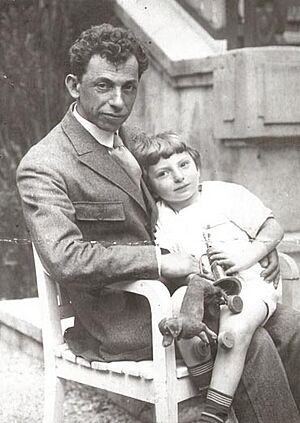David Bergelson facts for kids
Quick facts for kids
David Bergelson
|
|
|---|---|
| דוד בערגעלסאָן | |

David Bergelson with his son Lev
|
|
| Born | 12 August 1884 Okhrimovo, Kiev province, Russian Empire (now Sarny, Cherkasy region, Ukraine)
|
| Died | 12 August 1952 (aged 68) Lubyanka prison, Moscow, Soviet Union
|
| Known for | Yiddish Writer |
David Bergelson (born August 12, 1884 – died August 12, 1952) was an important writer who wrote in the Yiddish language. He was born in the Russian Empire. He lived in Berlin, Germany, for some time. Later, he moved to the Soviet Union when the Nazis gained power in Germany. Sadly, he was a victim of unfair accusations after World War II. He was one of many writers who were killed during an event known as the Night of the Murdered Poets.
Contents
Early Life and Education
David Bergelson was born on August 12, 1884. His birthplace was a small Jewish town called a shtetl named Okhrimovo. This town was in what is now Ukraine. His early years were difficult for Jewish communities. There were many attacks and violent events against Jewish people.
David grew up in a family that was wealthy and religious. They spoke Yiddish at home. His father was a merchant who traded grain and timber. His mother came from a family that loved books and writing. A special teacher, called a maskil, taught him many subjects. These included Hebrew, Russian, and Yiddish. However, this education was not enough for him to go to a university later on.
Becoming a Writer
Bergelson became known as a writer after the failed Russian Revolution of 1905. He came from a religious Jewish background. But he also had a modern education. Much of his writing was like the famous writer Anton Chekhov. He wrote stories about young people who felt stuck in their small town lives.
At first, he tried writing in Hebrew and Russian. But he only found success when he wrote in Yiddish. His first successful book was a short novel called Arum Vokzal (At the Depot). He paid to publish it himself in 1909.
In 1917, he helped start the Yidishe Kultur Lige (Yiddish Culture League) in Kiev. This group supported new and experimental Yiddish art. In 1921, he moved to Berlin, Germany. He lived there for many years. He also traveled a lot, visiting other parts of Europe and even the United States. He went to cities like Philadelphia and New York. He was known as one of the most famous Yiddish writers of the 1920s. He also wrote for a Yiddish newspaper in New York called The Forward.
Life in the Soviet Union
In 1926, David Bergelson wrote an essay called "Three Centers." In it, he believed that the Soviet Union was becoming the most important place for Yiddish literature. This was because the Soviet government supported Yiddish language and writing at that time. He started writing for Communist Yiddish newspapers. In 1933, he moved to the Soviet Union. This was around the time the Nazis took power in Germany.
He was impressed by the Jewish Autonomous Republic of Birobidzhan. This was a special region for Jewish people in the Soviet Union. During World War II, he joined the Jewish Anti-Fascist Committee. This group worked to fight against the Nazis. He helped edit a part of their newspaper, Eynikayt (Unity).
However, after the war, things changed. Many Jewish writers in the Soviet Union became targets of unfair accusations. David Bergelson was arrested in January 1949. He was tried in secret. Sadly, he was put to death on August 12, 1952. This was part of the tragic event known as the Night of the Murdered Poets. After the Soviet leader Stalin died, Bergelson was cleared of all charges in 1955. His complete works were then published in the Soviet Union in 1961.
David Bergelson had one child, a son named Lev Bergelson. Lev became a well-known scientist who studied biochemistry. He also served as a captain in the Soviet Army during World War II. In 1991, Lev Bergelson moved to Israel with his wife, Naomi. Both of them passed away in 2014.
His Books
Here are some of the books David Bergelson wrote:
- Arum Vokzal (At the Depot, a short novel, 1909)
- Opgang (a short novel, also known as Descent, 1921)
- Nokh Alemen; translated as When All Is Said and Done or The End of Everything.
- Divine Justice (novel, 1925)
- "Three Centers" (an essay, 1926)
- Storm Days (short stories, 1928)
- Mides Hadin (novel, 1929), also known as "Judgment"
- Baym Dnieper (At the Dnieper, novel, 1932)
- Materialn (memoir, 1934)
- The Jewish Autonomous Region (a pamphlet)
- Naye Dertseylungen (New Stories, war stories, 1947)
Books Translated into English
- When All Is Said and Done, translated by Bernard Martin. Published in 1977.
- The End of Everything, translated and edited by Joseph Sherman. Published in 2010.
- The Stories of David Bergelson: Yiddish Short Fiction from Russia (includes two short stories and the novel Departing), translated by Golda Werman. Published in 1996.
- Descent (also called Departing), translated by Joseph Sherman. Published in 1999.
- Shadows of Berlin: the Berlin stories of Dovid Bergelson (includes seven short stories), translated by Joachim Neugroschel. Published in 2005.
- Judgment: A Novel, translated by Harriet Murav and Sasha Senderovich. Published in 2017.
 | Valerie Thomas |
 | Frederick McKinley Jones |
 | George Edward Alcorn Jr. |
 | Thomas Mensah |

